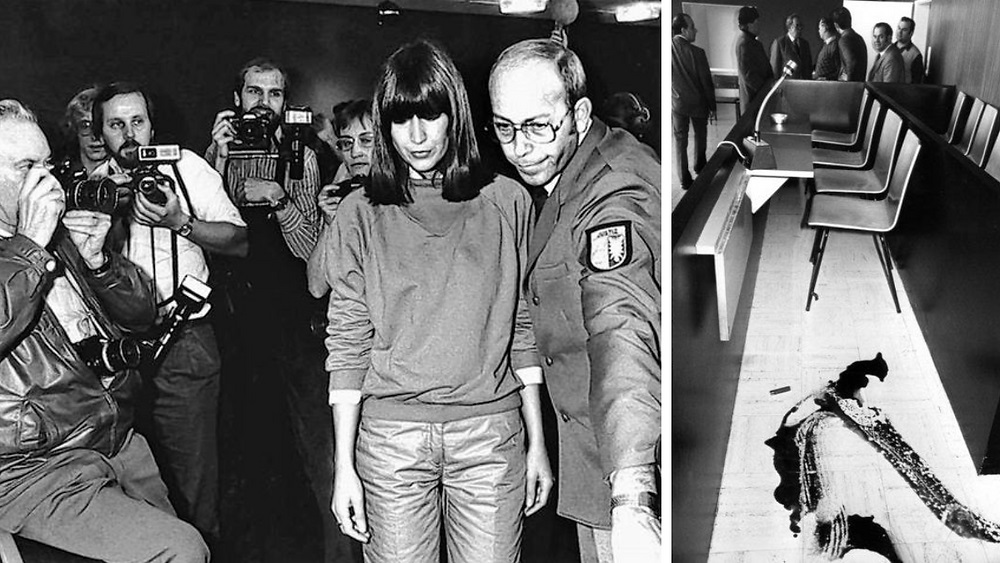Marianne Bachmeier: The Mother Who Took Justice Into Her Own Hands - A True Story
Could a mothers love justify an act of vengeance within the confines of a courtroom? Marianne Bachmeiers actions, fueled by the unthinkable murder of her daughter, sparked a global firestorm of debate, forcing the world to confront the very essence of justice and morality.
The tale of Marianne Bachmeier is not merely a recounting of a tragic event; it is a profound exploration of the human condition under duress. It is a story that continues to echo through time, raising unsettling questions about the boundaries of grief, the efficacy of the legal system, and the potential for the lines between victim and perpetrator to blur in the face of unimaginable pain. This narrative, etched in the annals of West German history, unfolded against the backdrop of a small town and a courtroom, forever altering the lives of those involved and leaving an indelible mark on the collective consciousness.
Marianne Bachmeier, born on June 3, 1950, in a world grappling with the aftermath of war, found herself raising her daughter, Anna, as a single mother. Her life, rooted in the town of Sarstedt near Hildesheim in Lower Saxony, West Germany, was far from easy. She worked as a waitress in Lbeck to provide for her child, while the circumstances around Anna's father remained distant and detached. This solitary path, burdened by the struggles of single motherhood, would eventually lead her to a courtroom in Lbeck, a place where her life, and the life of many others, would be irrevocably changed.
- Gymkhana Telugu Movie Updates Latest News Streaming Explore Now
- Hdhub4u Watch Download Movies What You Need To Know
| Category | Details |
|---|---|
| Full Name | Marianne Bachmeier |
| Date of Birth | June 3, 1950 |
| Place of Birth | Sarstedt, near Hildesheim, Lower Saxony, West Germany |
| Children | Anna Bachmeier (born November 14, 1972) and two older children who were given up for adoption. |
| Occupation | Waitress, Pub Owner (Lbeck, Germany) |
| Significant Event | Shot and killed Klaus Grabowski in a Lbeck courtroom on March 6, 1981, the man accused of murdering her daughter, Anna. |
| Sentence | Sentenced to 6 years in prison (March 2, 1983) |
| Death | Committed suicide on September 27, 1993, in Lbeck. |
| Legacy | Sparked global debate on justice, morality, and vigilantism; influenced courtroom security measures; subject of films and media coverage. |
| Additional Information | Bachmeier was a single mother, ran a pub in the 1970s, and lived with her daughter Anna. |
| Reference | Wikipedia: Marianne Bachmeier |
The genesis of the tragedy lies in the abduction and murder of Anna, a seven-year-old girl, in 1980. The man accused of this heinous crime was Klaus Grabowski, a 35-year-old known sex offender. It was this act of unimaginable cruelty that would set in motion the chain of events culminating in the courtroom shooting. Marianne Bachmeiers world shattered, and her pain became a visible wound that would drive her actions.
The details surrounding Anna's early life, born in Lbeck, Germany, on November 14, 1972, were, in many ways, shaped by the circumstances of her parentage. Marianne, then 23, found herself navigating the complexities of single motherhood, her responsibilities as a caregiver defined by the absence of Annas father. While Marianne toiled as a waitress, Anna attended elementary school, painting a picture of a life lived with a singular focus on survival and family.
The trial of Klaus Grabowski commenced, bringing the raw emotions of the situation to the forefront. On March 6, 1981, during the trial, Marianne Bachmeier entered the courtroom armed with a Beretta 70. In a calculated and decisive act, she fired seven shots at Grabowski. Six bullets found their mark; he died as a result. The courtroom, once a place of legal proceedings, was transformed into a theater of revenge.
- Movierulz 2025 Latest South Indian Movies News Must Know
- Unraveling The Rise Fall Of Jazmine Tans Persona
Her actions sparked an immediate and intense reaction. She was taken into custody without resistance. In an instant, she became a symbol of a grief-stricken mother pushed to the edge. Her statement to the judge, I wanted to kill him, became a chilling testament to the depth of her despair and the finality of her decision.
The aftermath was swift and dramatic. The act of vigilantism triggered an avalanche of media coverage and public debate. The case exploded, forcing society to grapple with uncomfortable questions about justice, revenge, and the emotional extremes to which a grieving person might be driven. The discussion encompassed the nature of vigilantism, the limits of justice, and the complex intersection of mental state and actions.
The legal consequences were inevitable. On March 2, 1983, Marianne Bachmeier was sentenced to six years in prison for her actions. Despite the punishment, the moral debate surrounding her case continued. Her story, filled with complexities, resonated with people across the globe due to its tragic elements, its desperate need for justice, and the raw emotional depths of a mothers unconditional love.
The impact of her actions stretched beyond the courtroom and the prison cell. The case led to changes in courtroom security measures, a direct response to the vulnerability exposed by the shooting. It also served as the inspiration for two German films released in 1984, each offering a potentially embellished version of Marianne and Anna's life together, thus entering into the realm of fiction a chapter of reality. These films, though inspired by her story, further complicated the narrative, blurring the lines between truth and artistic interpretation.
Marianne Bachmeier's legacy is one of tragedy, a poignant reminder of the failures inherent within any system. Her story became a cautionary tale about the terrible price of justice systems that are imperfect. She was laid to rest in a Lbeck cemetery, beside the grave of her beloved Anna, a final resting place that symbolized both her grief and her undying love.
Bachmeier's story raises questions about how society should view individuals pushed to the limits of human endurance, her actions become a lens through which we examine the complexities of the law, the role of emotion, and the inherent challenges in applying justice. Her story stands as a testament to the lasting impact that grief can have on the human psyche and the far-reaching consequences of a single, desperate act.
The case of Marianne Bachmeier remains a compelling and unsettling study in the dynamics of human emotion and law. Her case continues to force us to acknowledge the difficult moral questions that arise when the boundaries of justice, revenge, and grief blur, questions that will continue to engage minds for generations to come. Her story is a stark reminder of the depths of sorrow a mother can endure and the extreme lengths to which a person can be pushed when confronting the loss of a child.
The tragic tale of Marianne Bachmeier, the woman who sought justice for her daughter Anna in a courtroom, is a narrative that continues to resonate with people across the world. This is because of its blend of deep tragedy, the undeniable quest for justice, and the raw, emotional depths of a mothers unwavering love. In Germany, she became known as the "Revenge Mother", her actions making headlines across the nation, solidifying her place in a story that intertwines heartache, injustice, and the enduring complexities of the human spirit.
The deeply disturbing past of Grabowski, his past as a sex offender, is crucial to understanding the context of the events. It was this past, this history of predatory behavior, that was at the heart of the tragedy. The killing of Anna was an act of monstrous violence and a dark prelude to the events in the courtroom.
Marianne Bachmeiers story is a poignant reminder of the complexities of human emotion and the law. Her actions opened a Pandoras Box of ethical and legal discussions that remain relevant today. They force us to confront uncomfortable questions about justice, revenge, and the lengths to which a grieving person might go to seek retribution.
The story, when viewed through the lens of the U.S., the incident in the courtroom, the act of vengeance, serves as a dramatic testament to the intensity of a mothers grief and the limits to which a person can be pushed when facing injustice. The case of Marianne Bachmeier stands as a potent reminder of the complexities of human emotion, the law, and the far-reaching consequences of seeking justice in the face of unimaginable personal tragedy.
The publication of articles in the weekly magazine Stern, after exclusive rights were secured, helped to shed light on Mariannes background and her trials, as a struggling single mother. The series of articles, delving into the case, offered the public a detailed understanding of the woman who had become both a symbol of grief and the act of vengeance.
The story of Marianne Bachmeier offers a stark warning about the failures of a justice system. It highlights how the search for justice can become a tragic reflection of the failure of justice systems, emphasizing the terrible cost of such systemic failures.
The film, "Based on the real case of Marianne Bachmeier from 1981," offers a cinematic retelling. It presents the story of a mother resolutely firing seven shots at her daughters killer in the courtroom. With Marie Colbin, Michael Gwisdek, Christine Limbach, and Angela Schmid, the film offers a glimpse into the heart of the tragedy.
Article Recommendations
- Where To Watch Alternatives Your Guide To Vega Vegamoviesist
- Latest Updates Movierulz Movie News Reviews



Detail Author:
- Name : Prof. Leilani Auer DVM
- Username : karl.welch
- Email : elissa.jacobi@casper.net
- Birthdate : 1993-03-21
- Address : 7358 Bertrand Light New Gilbertofort, KS 56419-8242
- Phone : (251) 707-6231
- Company : Orn, Heathcote and Mertz
- Job : Motorboat Mechanic
- Bio : Suscipit molestias repellendus perferendis omnis voluptates quisquam voluptas quibusdam. Voluptate quo eum nihil tempora. Repellendus debitis aspernatur voluptatem velit veritatis commodi saepe.
Socials
instagram:
- url : https://instagram.com/gene9508
- username : gene9508
- bio : Incidunt ipsam quae cum natus. Sed labore ut repellat ipsam. Voluptatem ut odit numquam autem qui.
- followers : 6540
- following : 2051
facebook:
- url : https://facebook.com/simonis2014
- username : simonis2014
- bio : Voluptatem autem blanditiis aut non quaerat quidem quasi.
- followers : 3238
- following : 338
twitter:
- url : https://twitter.com/simonisg
- username : simonisg
- bio : Iure velit architecto voluptas fuga dolorem ad minus commodi. Ipsam voluptate recusandae quis et veniam.
- followers : 2645
- following : 1644
tiktok:
- url : https://tiktok.com/@genesimonis
- username : genesimonis
- bio : Cum odio iusto sapiente et enim voluptatem. Voluptas maxime praesentium qui et.
- followers : 5876
- following : 1563
linkedin:
- url : https://linkedin.com/in/simonis2014
- username : simonis2014
- bio : Nostrum soluta soluta libero praesentium.
- followers : 5382
- following : 1140